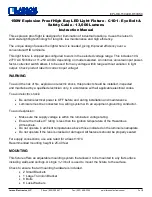
43
Manual tipping upwards:
-
Move the tipping handle to gradually tip the skip to empty it. We remind you that to be emptied, the
skip must be unlocked (see detailed image G)
-
When the skip is emptied, it must be locked (see detailed image H) by moving the skip lock before
lowering the mobile equipment.
Before doing an empty test, check that the ladder slope is greater than or equal to 30° in relation to the
ground in order to guarantee that the skip returns in good conditions.
Due to the high dynamic forces generated during the upward tip, it must be ensured that the end of the
ladder is well supported. We recommend the use of the pair of headboard props (see page 69). However,
other means are possible, provided that the headboard is well supported and fixed to the building to
prevent the hoist from sliding or tipping over
.
Carry out several empty tests (skip locked) and then loaded tests (skip unlocked):
-
assembly of the mobile equipment,
-
manual tipping up of the skip,
-
return of the skip,
-
descent of the mobile equipment,
-
manual tipping downwards of the skip.
Also verify that the upper limit switch is working properly.
If necessary, adjust the position of this upper limit switch by moving the clamping handle and the flange
(see chapter entitled “Installing the upper limit switch on the ladder” page 27)
When all of the above points have been checked, the tipping skip is ready for use.
Summary of Contents for 312175001
Page 14: ...14 SAFETY MARKINGS ON THE MACHINE WINCH BASE LADDER HEADBOARD ACCESSORIES...
Page 18: ...18 ASSEMBLY EXAMPLES...
Page 40: ...40 OVERLOAD OF THE DOUBLE TIPPING SKIP MAX PAYLOAD 150kg...
Page 51: ...51 EXAMPLES OF INCLINED INSTALLATIONS OF THE HOIST ON THE FA ADE OF A BUILDING...
Page 60: ...60 EXAMPLES OF VERTICAL INSTALLATIONS OF THE HOIST ON THE FA ADE OF A BUILDING...
Page 67: ...67 1 1 2 2 2 1 4 4 3 3...
Page 70: ...70...
Page 75: ...75...
Page 86: ...86 ELECTRICAL DIAGRAM OF THE ABM VF 200 250 WINCHES for MAXIAL EXCELLIUM and EXPERT...
Page 87: ...87 DETAILS OF ELECTRICAL CONNECTIONS TO THE FREQUENCY CONVERTER...
















































